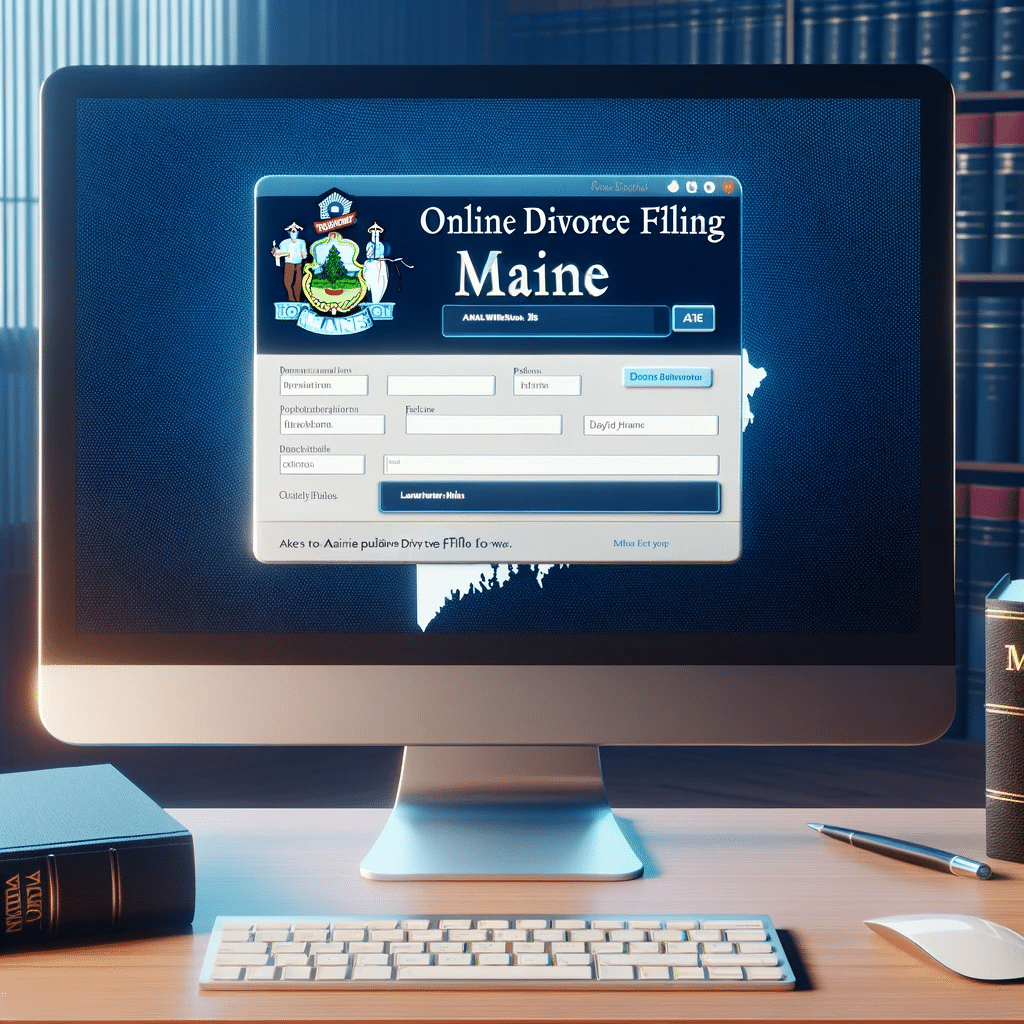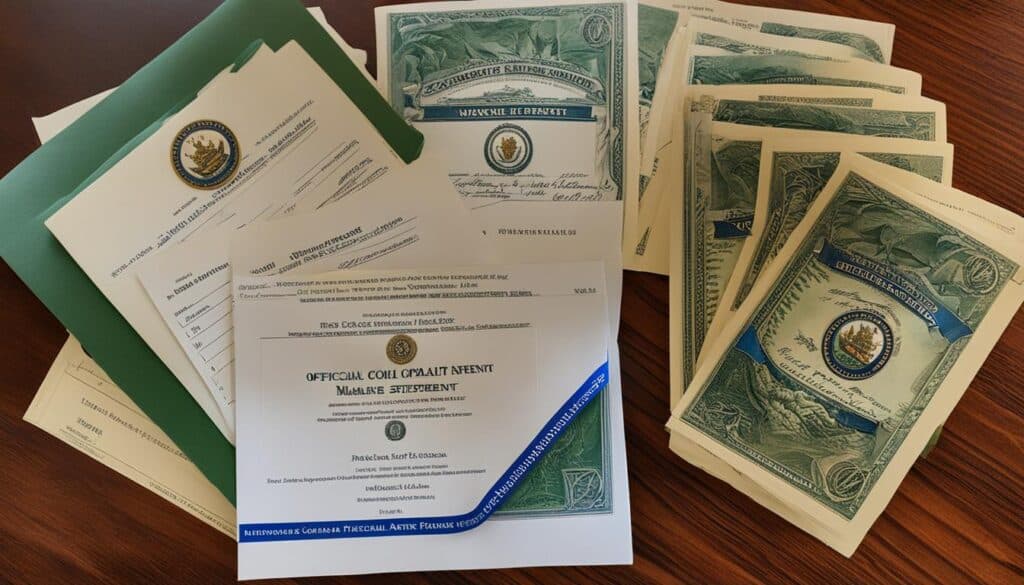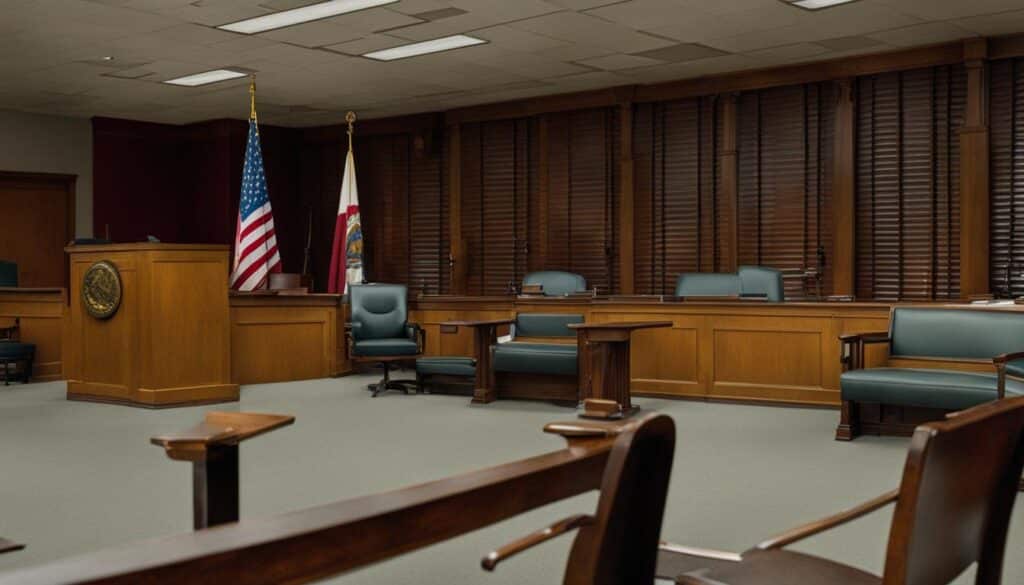Physical Address
304 North Cardinal St.
Dorchester Center, MA 02124
Physical Address
304 North Cardinal St.
Dorchester Center, MA 02124

Embarking on the process of filing for divorce in Maine is like navigating a ship through a misty harbor. It’s a journey that intertwines legal procedures with personal transformations. Maine’s divorce process comes with its unique set of laws and requirements, forming a distinctive course to chart.

From residency criteria to the complexities of legal paperwork, every element plays a vital role. However, steering through these waters doesn’t have to be a solitary voyage.
This article is like your lighthouse, guiding you through Maine’s divorce laws. We’ll clarify the legal intricacies and acknowledge the emotional currents.
Ready to set sail on this important journey in the Pine Tree State? Keep reading to learn about the crucial steps for filing for divorce in Maine, and embark on this path with confidence and understanding.
For more on how to file for divorce, check out our article, How to File for Divorce: A Concise Guide for Couples.
If you are considering filing for divorce in Maine, you first have to make sure you meet the residency requirements.
To proceed with a divorce in Maine, you must meet one of the following criteria:
You’ll need to provide sufficient evidence of residency when filing for divorce to ensure that your case is valid and will be processed by the court.
Now that you understand the residency requirements, let’s move on to the grounds for divorce in Maine. This will help you determine the legal basis for ending your marriage and proceed with the appropriate legal procedures.
| Residency Requirements for Divorce in Maine | Eligibility |
|---|---|
| You have lived in Maine for at least six months. | If you have been a resident of Maine for at least six months, you are eligible to file for divorce in the state. |
| Your spouse is a resident of Maine. | If your spouse is a resident of Maine, you can file for divorce in the state regardless of your own residency status. |
| You are a resident of Maine, and either you married your spouse in the state or the cause of your divorce happened in Maine. | If you are a resident of Maine and either married your spouse in the state or the cause of your divorce occurred in Maine, you are eligible to file for divorce in Maine. |

To file for divorce in Maine, you need to have legal grounds for divorce. In Maine, both fault and no-fault grounds are recognized.
A no-fault divorce can be filed based on irreconcilable marital differences, meaning that you and your spouse can’t get along and there’s no reasonable prospect of reconciliation. This is the most common type of divorce in Maine.
If you choose to file for divorce based on fault grounds, there are several options available. These include adultery, cruel and abusive treatment, extreme cruelty, desertion for three consecutive years, refusal or neglect to support, alcohol or drug abuse, and impotence.
Proving fault can be more complicated and may require additional evidence.
When determining which grounds to file for divorce in Maine, consider the specific circumstances of your situation. Consulting with an attorney can help you understand the advantages and disadvantages of each option and guide you through the process.
| No-Fault Grounds | Fault Grounds |
|---|---|
| Irreconcilable marital differences | Adultery |
| Cruel and abusive treatment | |
| Extreme cruelty | |
| Desertion for three consecutive years | |
| Refusal or neglect to support | |
| Alcohol or drug abuse | |
| Impotence |
When filing for divorce in Maine, you will need to determine whether your divorce will be uncontested or contested. Understanding the difference between the two can help you navigate the process more effectively.
Uncontested Divorce: If you and your spouse are in agreement on all aspects of the divorce, including child custody, division of assets, and support, you can file for an uncontested divorce.
This type of divorce is generally quicker, less expensive, and requires fewer court hearings. It allows you and your spouse to have more control over the outcome and can promote a more amicable separation.
Contested Divorce: In a contested divorce, you and your spouse are unable to reach an agreement on one or more important issues. This can include disagreements over child custody, division of assets, or spousal support.
In a contested divorce, additional steps, such as court hearings and mediation, may be required to resolve these issues. This usually makes it a more complex and lengthy process.
| Uncontested Divorce in Maine | Contested Divorce in Maine |
|---|---|
| An agreement has been reached on all aspects of the divorce | Disagreements exist on one or more important issues |
| Quicker, less expensive process | Potentially more complex and lengthy process |
| Fewer court hearings | Additional court hearings and mediation may be required |
| Promotes amicable separation | May involve more conflict and tension |
When deciding between an uncontested and contested divorce in Maine, carefully consider your individual circumstances and consult with an attorney if necessary. Regardless of the type of divorce you choose, ensure that your rights and interests are protected throughout the process.

When filing for divorce in Maine, one of the crucial steps is preparing and filing the necessary forms. These forms are essential for initiating the divorce process and ensuring that all required information is provided.
To help you navigate this stage smoothly, here is a breakdown of the key forms and how to prepare them.
To begin, you will need to download the necessary forms from the Maine Courts website. These forms include:
Each of these forms serves a specific purpose and must be completed accurately.
The Complaint for Divorce outlines the reasons for the divorce and the relief sought. The Summons notifies your spouse that a divorce action has been initiated against them. The Notice Regarding Electronic Service provides information on electronic communication during the divorce process. The Family and Probate Matter Summary Sheet includes vital details about the case, such as the parties involved and the requested relief.
You may also need to provide a Social Security Number Confidential Disclosure Form and a Child Support Affidavit if child support is a relevant aspect of your divorce.
Carefully review each form and fill in all necessary information. Any inaccuracies or omissions can potentially delay the divorce process.
| Form | Purpose |
|---|---|
| Complaint for Divorce | Outlines reasons for divorce and relief sought |
| Summons | Notifies spouse of divorce action |
| Notice Regarding Electronic Service | Provides information on electronic communication |
| Family and Probate Matter Summary Sheet | Includes essential case details |
| Social Security Number Confidential Disclosure Form | Confidentially discloses Social Security numbers |
| Child Support Affidavit (if applicable) | Provides information on child support |
Once you have completed the forms, you’ll submit them to the Maine District Court in the county where either you or your spouse resides. Remember to keep copies of all filed forms for your records.
By properly preparing and filing the divorce forms in Maine, you can ensure that your case progresses smoothly. It is always recommended to consult the Maine Courts website or seek legal advice to ensure compliance with the latest requirements and procedures.
When filing the divorce papers, a fee is required, which may vary depending on the county. However, if you are unable to afford the filing fees, you can request a fee waiver. Fee waivers are subject to approval and require certain financial criteria to be met.
After filing the divorce papers, you will need to serve them to your spouse. This can be done through various methods such as mail, certified mail, or by hiring a process server. You’ll need to make sure the papers are properly served to your spouse within the required timeframe as specified by Maine law.
| Step | Description |
|---|---|
| 1 | Complete the necessary divorce forms |
| 2 | File the completed forms with the Maine District Court |
| 3 | Pay the filing fee or applying for a fee waiver |
| 4 | Serve the divorce papers to your spouse |
Follow the correct procedures and timelines throughout the filing and serving process. Failure to do so could result in delays or complications in your divorce proceedings.
If you have any doubts or concerns, seek legal advice or consult the resources available on the Maine Courts website to ensure a smooth and successful filing of your divorce papers.
Once you have been served with divorce papers in Maine, you have to respond within a specific timeframe. Your response will depend on whether you agree or disagree with the terms outlined in the papers.
Filing an answer is a common response to divorce papers. In your answer, you can either admit or deny the allegations made by your spouse regarding the grounds for divorce or any other claims.
This is an opportunity for you to present your side of the story and assert any relevant defenses or counterclaims. Provide clear and concise responses to each allegation and consult with an attorney, if necessary, to ensure that your rights are protected.
If you have your own claims against your spouse, such as custody or property division issues, you may file an answer and counterclaim. This allows you to not only respond to the divorce papers but also assert your own requests and demands.
By filing a counterclaim, you are actively participating in the divorce process and seeking a resolution that aligns with your interests. Gather all necessary documentation and evidence to support your counterclaim.
If you fail to respond to the divorce papers within the specified timeframe, your spouse may request a default divorce judgment. This means that the court can make decisions regarding the divorce without your input or presence.
A default judgment may not always favor your interests, and it’s generally advisable to respond to the papers to ensure that your rights are protected.
Remember, every divorce case is unique. It’s almost always a good idea to consult with an attorney who specializes in family law to understand your rights, responsibilities, and the best course of action for your situation.
By responding to the divorce papers in a timely and appropriate manner, you can actively participate in the divorce process and work towards achieving a fair resolution.
When filing for divorce in Maine, financial disclosures are a key part of the process. These disclosures provide a comprehensive overview of each spouse’s financial situation and play a crucial role in property division and determining alimony.
The financial disclosures require both parties to provide detailed information about their income, assets, debts, and expenses. This includes documentation such as tax returns, bank statements, retirement account statements, and mortgage statements. Accurate and complete information is a must to ensure a fair resolution.
Table: Financial Disclosures Checklist
| Document | Description |
|---|---|
| Income | Provide copies of recent pay stubs, employment contracts, and any other sources of income. |
| Assets | List all assets, including real estate, vehicles, investments, and personal property, along with their estimated values. |
| Debts | Disclose all outstanding debts, such as credit card balances, loans, and mortgages. |
| Expenses | Outline monthly expenses for both spouses, including housing costs, utilities, transportation, and childcare. |
If you’re considering filing for divorce in Maine without hiring an attorney, there are resources available to help you navigate the process. This can be a cost-effective option for couples who can come to agreements on important issues such as asset division and child custody.
However, handling a divorce without legal representation requires careful attention to detail and a good understanding of the legal process.
Before proceeding with filing for divorce without an attorney, ensure that you meet the eligibility requirements. This includes satisfying the residency requirements in Maine and determining if you and your spouse are in agreement about the divorce.
The Maine Courts website offers self-help resources for individuals navigating a divorce without an attorney. These resources provide guidance on filling out the necessary forms, understanding the court process, and addressing common legal issues that may arise during the divorce process. Review these resources thoroughly to ensure you have a clear understanding of the steps involved.
Consider utilizing mediation services to help facilitate negotiations between you and your spouse. Mediation can provide a neutral third party to assist in reaching agreements on contentious issues, such as child custody and property division. This process can help reduce conflict and potentially expedite the overall divorce process.
Filing for divorce without an attorney requires careful preparation, research, and a commitment to understanding the legal requirements in Maine. While it is possible to navigate the process independently, consider consulting with a legal professional to ensure you fully understand your rights and responsibilities.

Once you have filed for divorce in Maine and served the necessary papers to your spouse, the divorce process moves to the court. The court process in Maine may involve several hearings and appearances, culminating in a final divorce hearing if the divorce is contested.
The court may schedule case management conferences to discuss the status of your case, set deadlines for submitting necessary documents, and address any preliminary issues.
These conferences are an opportunity for you and your spouse, along with your respective attorneys if applicable, to communicate with the court and establish a timeline for the divorce proceedings.
In some cases, the court may hold hearings to address temporary orders regarding child custody, visitation, child support, spousal support, or the use of marital property during the divorce process.
These hearings are designed to establish temporary arrangements until the final divorce hearing. It is important to prepare for these hearings and present your case effectively to ensure the best outcome for yourself and any children involved.
If your divorce is contested, meaning you and your spouse cannot come to an agreement on certain issues, the court may schedule a final divorce hearing.
During this hearing, both parties will have the opportunity to present evidence, call witnesses if necessary, and make arguments regarding the unresolved issues. The judge will then make decisions on property division, child custody, child support, and any other outstanding matters.
If your case proceeds to trial, it is crucial to be prepared and have a clear understanding of the evidence and arguments you will present. Having an experienced attorney by your side can greatly assist you in navigating the trial process and advocating for your interests.
| Step | Description |
|---|---|
| 1. Case Management Conferences | Court conferences to discuss case status and set deadlines. |
| 2. Hearings for Temporary Orders | Hearings to address temporary arrangements during divorce. |
| 3. Final Divorce Hearing | Hearing where the judge makes final decisions on unresolved issues. |
Filing for divorce in Maine can be a challenging and emotional journey, but with the right information and preparation, you can navigate the process successfully.
Before getting started, make sure you understand the eligibility requirements, grounds for divorce, and the steps involved in preparing and filing the necessary forms.
Whether you choose to file for an uncontested or contested divorce, ensuring that all required forms are filled out accurately and filed correctly is essential. Remember to exchange financial disclosures to facilitate a fair division of property and consideration of alimony.
If you decide to handle your divorce without an attorney, use the self-help resources available on the Maine Courts website or consider mediation to help resolve any contested issues.
However, bear in mind that proceeding without legal assistance requires careful attention to detail and a solid understanding of the legal process.
Finalizing your divorce in Maine requires attending any necessary court hearings and adhering to court procedures. Be prepared for various court appearances, including case management conferences and potentially a final divorce hearing. Seeking legal advice or assistance can provide invaluable support and guidance throughout the process.
To see how this process of filing for divorce in Maine compares to that in other states, check out our articles about how to file for divorce in New Hampshire and filing for divorce in West Virginia.
To file for divorce in Maine, you must meet one of the following residency requirements: you have lived in Maine for at least six months, your spouse is a Maine resident, or you are a resident of Maine and either you married your spouse in the state or the cause of your divorce happened in Maine.
Maine allows both fault and no-fault grounds for divorce. No-fault grounds include irreconcilable marital differences, indicating that the spouses can’t get along and there is no reasonable prospect of reconciliation. Fault-based grounds include adultery, cruel and abusive treatment, extreme cruelty, desertion for three consecutive years, refusal or neglect to support, alcohol or drug abuse, and impotence.
If you and your spouse have agreed on all the terms of your divorce, including the division of assets and child custody, you can file for an uncontested divorce in Maine. This process is generally easier, quicker, and less expensive. However, if you and your spouse are unable to reach an agreement, your divorce will be considered contested, and additional steps and court hearings may be required.
To begin the divorce process in Maine, you will need to prepare and file several forms, including the Complaint for Divorce, Summons, Notice Regarding Electronic Service, Family and Probate Matter Summary Sheet, Social Security Number Confidential Disclosure Form, and Child Support Affidavit (if applicable). These forms can be downloaded from the Maine Courts website.
After completing the divorce forms, you will need to file them with the Maine District Court in the county where either you or your spouse lives. There are two methods of filing: serving the papers to your spouse before filing the complaint or filing the complaint first and then serving the papers. The papers can be served by mail, certified mail, or through a process server.
After being served with the divorce papers, the spouse must respond within a specific timeframe. If they fail to respond, a default divorce judgment may be granted. If the divorce is contested, the court may require additional hearings and mediation to resolve any issues.
In a Maine divorce, both parties are required to exchange and file financial disclosures. This includes providing information about income, assets, debts, and expenses. The court will consider these disclosures when making decisions about property division and alimony.
It is possible to file for divorce in Maine without hiring an attorney. You can use self-help resources provided by the Maine Courts website or online divorce services. Mediation is also available to help you and your spouse reach agreements on contested issues. However, handling a divorce without an attorney requires attention to detail and understanding of the legal process.
The divorce court process in Maine may involve various hearings and court appearances. These can include case management conferences, hearings for temporary orders, and ultimately a final divorce hearing. If the divorce is contested, it may proceed to trial where a judge will make decisions on unresolved issues. Each step of the court process requires careful preparation and adherence to court procedures.
Filing for divorce in Maine can be a complex and emotional process, but understanding the steps involved and having the necessary information can help navigate the process more smoothly. Whether filing for an uncontested or contested divorce, it is important to ensure that all required forms are filed correctly, financial disclosures are provided, and any necessary court hearings are attended. Obtaining legal advice or assistance can be beneficial in ensuring the best outcome for your divorce case.